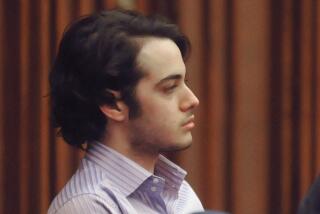‘Barefoot Bandit’ gets federal sentence
Colton Harris-Moore’s nearly four-year odyssey as the “Barefoot Bandit” came to a conclusion Friday when a federal judge sentenced him to 61/2 years in prison for the theft of airplanes, boats and guns in an audacious swath of crime that stretched from Washington state to the Bahamas.
“I should have died years ago,” Harris-Moore, 20, said in his first public statement since his arrest in 2010 shortly after he crash-landed one of his stolen planes on an island in the Caribbean.
“I’d like to first say that what I did could be called daring, but it is no stretch of the imagination to say that I’m lucky to be alive,” Harris-Moore, speaking in diffident tones and dressed in jail-issue khakis, told U.S. District Judge Richard A. Jones.
The federal sentence handed down Friday runs concurrently with an earlier 71/2-year sentence imposed by a state court in Washington for Harris-Moore’s crimes under state law, which included a series of home and business burglaries and thefts in several states as the brazen young fugitive kept two steps ahead of the law.
“My actions affected many people, and from a place of acceptance, humility and remorse I again apologize.... The day will come when things are made right,” Harris-Moore told the court.
Prompted by the judge to share his advice to the thousands of admirers around the world who followed his exploits via a Facebook fan page while he was on the lam, Harris-Moore said his flights in stolen planes with no formal flight training — though the realization of a lifelong dream — were in fact frightening.
“I would say that the things I did — some, I think, thought was perhaps cool — were extremely dangerous and terrifying,” he said. “It wasn’t as if I just jumped in a plane barefoot and started flying around. I feared for my life in those situations.”
Defense lawyers have said the 6-foot-5 youth had been a victim of a nightmarish childhood, in which he was forced to break into nearby homes to find food and clothing as a result of his mother’s alcoholism, abuse and neglect — an upbringing that was “worse than a dog’s,” defense lawyer John Henry Browne said.
“You’re about to hear now from a young person whose first memory is being told that everybody’s better off if he’d have been born dead,” he told the court as Harris-Moore made his way to the lectern.
Prosecutors said they took into account Harris-Moore’s rough childhood in agreeing to a sentence of just 61/2 years for crimes that resulted in $1.3 million in losses to victims.
“Having a bad childhood and dreaming of flying airplanes is not a reason to break into a bank and try to open a vault,” assistant U.S. Atty. Darwin Roberts, the lead federal prosecutor on the case, said at a news conference. “There are many, many kids across the country that have many of the disadvantages that Mr. Harris-Moore had without resorting to a life of crime.”
Federal authorities have also expressed doubts about the sincerity of Harris-Moore’s regrets, submitting to the court emails he wrote from jail in which he called sheriffs and local prosecutors “swine” and “asses” and the media “vermin.”
“The first remorse we heard was when he was caught,” Steven Dean, assistant special agent in charge of the FBI in Seattle, told reporters after the hearing. “There was no remorse. There was taunting. There was spray-paint cans [painting images of bare feet in businesses he burglarized] taunting the victims.... The first remorse I heard was when the defendant was in cuffs in the Bahamas.”
But the judge was clearly moved by the letter Harris-Moore wrote to the court describing what had drawn him into his brazen adventure — a letter the judge, at first skeptical, said seemed had been written by “someone with a master’s degree in journalism.”
“My childhood was not one I would wish on my darkest enemies,” said the letter, which both the prosecution and defense insisted was entirely in the defendant’s own words.
“My thirst for knowledge, cries for help, and coming of age was met with inept parents suffering from drugs and alcohol.... I was trapped with no outlet for my interests. I did what children do with idle time,” he wrote.
“Once I fell into the criminal system’s trap, the noose only tightened … I struggled with blaming the system or the cards I was dealt.... I had no father to teach me what life is, no one to teach me a sense of manhood.”
Feeling “robbed of my youth,” he said, he frequently escaped to the woods for long stretches — a place where he also frequently fled while on the run from the law.
“It was there that I learned the difference between loneliness and solitude, and through that experience, I found my spirit,” he wrote. “I breathed in the freedoms of nature, from the still trees to the pulsing waters, to the animals wandering and the birds circling, I learned lessons. It was here I learned I was drowning in a world [in which] I had yet a place to be.”
Emma Scanlan, co-defense counsel, said when she came to the case and heard of Harris-Moore’s exploits hiding in the woods, taking stolen boats across the Canadian border and crash-landing planes in the Cascade Mountains, “The first thing that struck me … was how unbelievably lonely all this sounds.”
More to Read
Sign up for Essential California
The most important California stories and recommendations in your inbox every morning.
You may occasionally receive promotional content from the Los Angeles Times.










